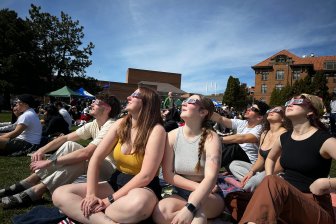The Vancouver Park Board is slated to vote Monday night on changes to its bylaw regulating sheltering in parks.
In its current form, the city’s Parks Control Bylaw allows people experiencing homelessness to shelter temporarily in a park between dusk and 7 a.m., with limits on proximity to certain amenities including sports fields, pools, beaches and trials.
A staff report headed to the board Monday evening proposes tightening those restrictions, citing the growing number of temporary dwellings, their “impact on public access to park space and amenities,” and the “strain” they are putting on city staff.

If approved, the modified bylaw would ban all built structures and restrict shelters to camping tents or canopies spaced one metre apart.
It would also ban sheltering under the canopy of a tree or within seven metres of a body of water. It would further allow the general manager of parks to inspect tents in designated shelter areas with 24-hour notice to prevent their use for criminal activities or the storage of dangerous goods.
The B.C. Civil Liberties Association has raised concerns about the changes, calling it an “iron fist approach.”
“We are in the middle of this housing crisis, we know that there are certain areas where folks rely on public space for survival,” spokesperson Latoya Farrell said.
“We’d like to see the amendments not passed and the Parks Board work with people with lived and living experience to establish a better pathway forward than just displacing folks.”

The vote comes the same day the park board said its cleanup of a designated homeless shelter area in CRAB park had been completed.
Sixteen people who had been occupying the space have now been allowed to return following the removal of built structures and unsafe items, while three people had accepted alternative shelter the city said.
That area has operated with a special exemption to the city’s sheltering bylaw since the park board lost an injunction application seeking to clear the park of campers in 2022.
The park board said that designated area will be made progressively smaller as housing is found for residents, with the goal of eventually eliminating it completely.
More on Politics
© 2024 Global News, a division of Corus Entertainment Inc.


